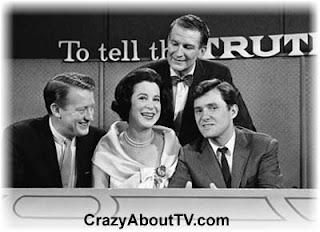 |
| Anybody else remember Kitty Carlisle? |
I was reminded of To Tell the Truth because I have noticed that people act in different ways in different situations. A great example of this was Chip, a guy I used to work with. In person, Chip was kind of dour, sort of all-business, and seemed to have no sense of humor at all. However, in the course of our work, we exchanged lots of e-mails, in which Chip would reveal another side of himself that no one would ever suspect. He was witty, clever, and had a keen sense of humor. Try as I might, though, I could never induce the e-mail version of Chip to reveal himself in person. It was almost as if he were two different people.
More recently, I have noticed a similar situation with Marsha, a woman I currently work with. In person, she is nice enough, but rather withdrawn, and exhibits little or no sense of humor. On the phone, however, she is a riot, expressing the same kind of cynical, Dilbert-is-my-life sense of humor that I have. Often, I laugh out loud when I am speaking with her on the phone, and wonder who she really is once the conversation is over. Will the real Marsha please stand up?
 And you may have noticed a difference in some of your real-life friends when they interact with others on Facebook, where many people feel free to be someone really different from whom they appear to be outside of Cyberspace. Brad Paisley explored this phenomenon in his song "Online," about a geek who is "so much cooler online."
And you may have noticed a difference in some of your real-life friends when they interact with others on Facebook, where many people feel free to be someone really different from whom they appear to be outside of Cyberspace. Brad Paisley explored this phenomenon in his song "Online," about a geek who is "so much cooler online."So, what's the deal? Why don't people behave the same way in every situation? Are they trying to fool those around them by pretending to be what they are not? If they seem one way in person and another way in e-mail, on the phone, or on social media, which one of them is the real one? Who are they, anyway?
An example of this is the "I" on the Briggs-Myers personality test. It stands for "introvert," as opposed to extrovert, which is the other possibility under this model. A simple definition for these terms is that an introvert is energized by spending time alone, while an extrovert is energized by spending time with other people. I have often observed that, while my brother Scott and I are alike in many ways, he is an extrovert and I am an introvert. However, when I made this observation recently to some family members, some of them said they thought that Scott is also an introvert . And when I described myself as an introvert to a lady I have worked with for more than 30 years, she was astonished, and said that she would have sworn that I am an extrovert.
 Have you ever noticed that there are some people with whom you are more relaxed, with whom you feel accepted, with whom you can make jokes, while there are other people with whom you feel inhibited or intimidated? Are there some situations in which you act one way, and other situations you act another way? If so, which one of these behaviors represents the real you? Which one makes you an impostor? If you're an introvert, for example, aren't you supposed to be one all the time?
Have you ever noticed that there are some people with whom you are more relaxed, with whom you feel accepted, with whom you can make jokes, while there are other people with whom you feel inhibited or intimidated? Are there some situations in which you act one way, and other situations you act another way? If so, which one of these behaviors represents the real you? Which one makes you an impostor? If you're an introvert, for example, aren't you supposed to be one all the time?I think we do people a disservice when we try to define or judge them too much by the ways they sometimes act. I have noticed this happens often in religious institutions when someone's weakness is revealed, when they fail to live up to their own standards, and the standards of the institution. While I agree that it is shocking and disappointing to learn that a televangelist visits prostitutes, for example, does that fact discount every good thing he may have done in his life? Does it mean that he doesn't love God, that he has no heart for people, that everything he ever did before he erred was just an act, that he was never anything more than a hypocrite? I don't think so.
Copyright © 2013 by Steven W. Fouse











































